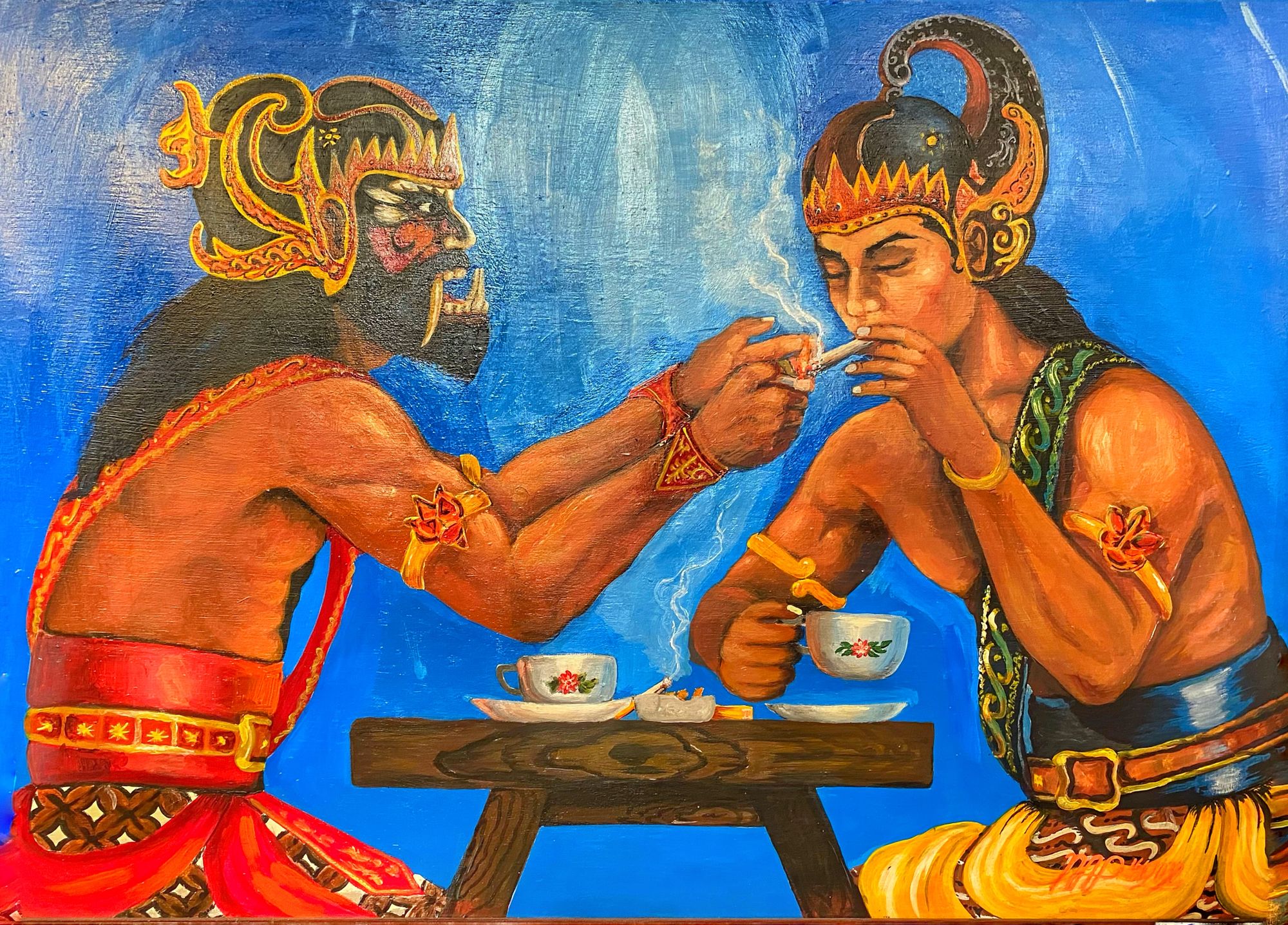Gods, monkeys and demons
I’ve been living in Indonesia for a year and a half, in a town called Ubud. I’m registered by the Argentine consulate as a foreign resident, with an address on Sriwedari Street. For the first six months, I couldn’t even leave the neighborhood because of the pandemic. Since I couldn’t travel, I dedicated my time to learning the language I now inhabit, in which there’s no past or future. Context is everything. Common associations are shifted in disquieting ways: for matters of the heart, they refer to the liver. They don’t feel butterflies in the stomach but fireflies in the head. When they speak about churches or butter, they do it in Portuguese. When it’s about cinema, the language is Dutch. If they talk about thoughts, books or schedules, they use Arabic. Colors and simple things such as bread or hats are referred to in Sanskrit. This language is cultural polyamory.
(Castellano aquí)
Time is shred in several directions. For the Javanese, it’s infinite. It can be wasted, because there’s always more. When you arrange to meet someone at any given time, they make clear that it’s a jam karet (“rubber clock”) kind of appointment, which makes for variations depending on traffic, rain or mood. The Javanese have a five-day week. The seven-day week is used only to make trade with the Christians and the Chinese easier, but it’s of secondary importance. The 28-day Muslim month gets out of step with the Gregorian calendar. A Monday is never just a Monday here. This is a good omen for the complete dissolution of schedules.
The word for “danger”, bahaya, is just one letter away (an aspirated, subtle sound) from being “happiness”, bahagia. Trying to combine both concepts, I began travelling around this huge country. After an expedition to the consulate in Jakarta, I gathered the courage to travel to Sumatra in January and to Surabaya, an old spice port, in February. I met Mijil and Yoga, two carefree Javanese that made me feel in a German road movie. They knew immediately that I was Argentine because my name is Omar, just like soccer star Batistuta - who is actually younger than me but, who needs a timeline here?
So began my escape from Ubud. Instead of going back to Sriwedari Street, I hopped on a small propeller airplane to do the Surabaya-Bandung route, a hermetic pairing which began with a hallucinating trip I did in my youth along the Chiang Mai-Surat Thani stretch. That passage in which for the first time origin and destination where hieroglyphs gave me the habit of getting into a cartography outside of the western, Christian world. That’s how a great passion began: to lose myself far away. I commited methodically and with a great deal of privilege to that nomadic life which had once been our only form of existence.
Then March came and the Suez Canal was blocked, Europe went back to lockdown and Argentina restricted all incoming flights. Cornered in the parenthesis of this country which goes form Banda Aceh to Jayapura, I decided to dance to that beat. I travelled to Semarang with Ajib Bintoro, a history and theology student. His teacher took us to a cave through a mountain path. There, while they were smudging, I felt the wet ground under my feet and understood that there was no going back and explanations weren’t necessary.
Later, I travelled to Borneo: the end of all roads, the gateway to the jungle. A coffee with squash jelly and clover later, what seemed at first sight a futureless episode became a robust present. We got lost in the great green hell and we escaped at the beginning of Ramadan, when the country stops altogether and travelling is, if not sacrilegious, a bad omen. In the Celebes Islands I met Christoper, a young Adventist who took me to see megaliths, forests and the bottom of the sea. We talked about dogma, crypto currency and the Chinese Communist Party; about the experience of getting old and the bewilderment of being alive. He opened the doors of his house to me, surrounded by children and a virtuous life strengthened by faith. There was also a certain infatuating, intriguing lack of attachment.
In Macasar I met Adi, doing a master’s degree in ethnic studies, who invited me to visit a local community. We slept in the leader’s house under a full moon and surrounded by ghost stories. Adi and his colleagues curled up among pillows in the middle of the room. In the morning, they let go of the cutlery to grab a small ball of rice with the right hand and get some fish which they then smear in a hellish sauce, to then stuff all that in their mouths and continue talking. With their mouths wide open, just like our parents taught us not to do. With open mouths and laughter and a pious kind of humor which tries not to stir the senses hijacked by religion.
It’s now night time and bugs swirl under the lantern in front of my house on Sriwedari Street. Just back from the Celebes, with my memory still fresh from everything conceivable – biscuits on the road, a boy who asked me Mau ke mana, “Where are you going?” -, just returned and too disheveled to live in Ubud, having encountered my destiny like the Dayako when they sense their prey in the wind. Just returned, then, I sat down to write in a house that is no longer my own, looking out into the damp night and the bugs orbiting the street lantern. Certain events would lead me to leave Ubud, but that night forewarned me. Why abandon such a peaceful home? Pillows, cats and a jute rug. Why leave it all, again? Gods, monkeys and demons. What else could be expected, after all those Salgari novels that rescued me from the boredom of childhood? There’s no home, there are relays. Some I can guess, others I can’t even dream of. Infinite moments of joy and refuge, gratitude and hurry.
A failed renegociation for the rent of the house on Sriwedari Street. The news of drunken ships with erratic itineraries. Rumours of pirates stalking a sunken volcano. How to disregard such drifting? Tonight, in Ubud, as I write, I’m back to packing up a house I’m going to leave tomorrow. Afar becomes near, becomes here to where my time in this land brings me, with their tongue in mine. I’m a South American who speaks about soccer in Indonesian because I can’t stop bribing them to be accepted as a brother in a family that, one day, I will also leave behind.

Ph: @yacarevolador
